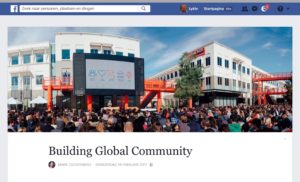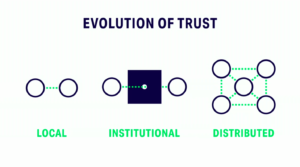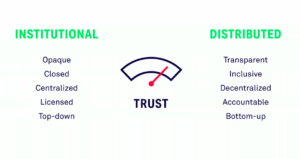Afgelopen week publiceerde Mark Zuckerberg, mede-oprichter van Facebook, een Manifesto over hoe hij denkt dat Facebook de wereld verder kan helpen:
the most important thing we at Facebook can do is develop the social infrastructure to give people the power to build a global community that works for all of us. – Mark Zuckerberg
Mooie doelstelling, alleen jammer dat Zuckerberg denkt dat hij dat met een commercieel bedrijf moet doen, waarvan de aandeelhouders toch vooral interesse hebben in de koers van het aandeel. Maar belangrijker nog, zoals Aral Balkan mooi beschrijft:
It is not the job of a corporation to “develop the social infrastructure for community” as Mark wants to do. Social infrastructure must belong to the commons, not to giant monopolistic corporations like Facebook. – Aral Balkan
Daarmee wil ik zeker niet zeggen dat een commercieel bedrijf geen bijdrage kan leveren aan de samenleving, maar wel dat de (sociale) infrastructuur waarin dat gebeurt niet in handen mag zijn van één bedrijf. Want (opnieuw Aral Balkan):
Facebook’s business model is to be the man in the middle; to track every move you, your family, and your friends make, to store all that information indefinitely, and continuously analyse it to understand you better in order to exploit you by manipulating you for financial and political gain.
Facebook isn’t a social network, it is a scanner that digitises human beings. It is, for all intents and purposes, the camera that captures your soul. Facebook’s business is to simulate you and to own and control your simulation, thereby owning and controlling you. – Aral Balkan
Mark Zuckerberg had applaus van me gekregen wanneer hij zijn doelstelling was opgevolgd met:”en dus gaan we volledig open source en stellen we onze infrastructuur open voor derden om direct concurrerende diensten op te ontwikkelen. Maar goed, dat zat er natuurlijk niet in.
Waarom vind ik dit belangrijk? Nou, zoals Ronald Mulder niet al te lang geleden opschreef:
Onder meer door het bestaan van schaalvoordelen leidt marktwerking vaak tot concentratie en zelfs monopolievorming – Ronald Mulder
Hij beargumenteerde dat er tot voor kort niet veel te doen leek te zijn tegen de platform- en netwerkeffecten die tegenwoordig beschikbaar zijn voor bedrijven zoals Facebook, en brak een lans voor de invoering van blockchain-technologie om dergelijke platformen meer open te maken.
Of dat lukt, moeten we nog zien. Maar ik wacht niet langer totdat Facebook laat blijken te snappen waar haar verantwoordelijkheid echt ligt. Dus ik stap op.
Doei, Facebook!
Post Scriptum 2018-03-21
Ondertussen is een grotere groep mensen boos op Facebook. Ik citeer Aral Balkan nog maar eens in reactie:
Want to #deletefacebook?
Don’t.
1. Sign up for @MastodonProject
2. Get on @wire and/or @signalapp
3. Write up a post on Facebook telling your friends about these alternatives and that they can find you there (& on your own web site if you have one).
Then #deletefacebook 🙂


